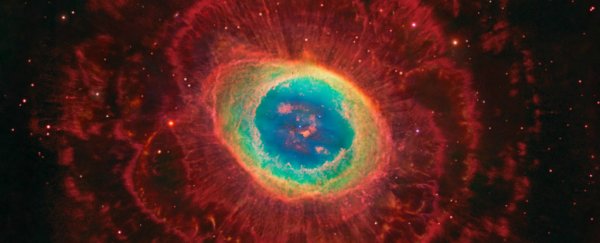An astrophysicist has put forward an interesting thought experiment this week: what if a civilisation of extraterrestrial life was advanced enough, it's possible that we might confuse its presence with the laws of physics.
In other words, what we think might be the effects of mysterious forces such as dark energy and dark matter in the Universe, could actually be the influence of alien intelligence - or maybe even aliens themselves.
Let's be clear - we're way outside the realms of evidence here, and this isn't an hypothesis that can easily be tested. And no one is actually suggesting that aliens are at work in the force of gravity of dark energy.
But what Caleb Scharf, director of astrobiology at Columbia University, is suggesting in a new article in Nautilus, is that, in theory at least, it's possible for an alien civilisation to become so advanced, it's indistinguishable from the laws of physics.
And there are already a few cosmic phenomena that could potentially be explained that way - or, at the very least, are so weird that we couldn't rule the possibility out.
Before you write this all off as crazy, this idea is basically an expansion of science fiction writer Arthur C. Clarke's three laws: that any sufficiently advanced technology is indistinguishable from magic.
Clarke was predominately a writer, so we have to take that into account, but when you imagine someone from today being sent back in time to the Stone Age with their hoverboard, iPhone, and wi-fi connection, it doesn't seem too out there. Even electricity seemed like magic when it was first discovered.
But at least our Stone Age ancestors would recognise us as being somehow related to them. Scharf's thought experiment takes things one step further.
"What if life has moved so far on that it doesn't just appear magical, but appears like physics?" he asks in Nautilus.
"After all, if the cosmos holds other life, and if some of that life has evolved beyond our own waypoints of complexity and technology, we should be considering some very extreme possibilities."
Scharf isn't the first person to suggest that we need to look for aliens beyond our idea of 'life'.
While life on Earth is based on carbon, astrobiologists have argued for decades that there might be life "not as we know it" out there in the Universe that use, say, methane instead.
It's also been suggested that advanced alien life could have long ago done away with their mortal bodies and uploaded themselves into some other, unrecognisable kind of technology.
There's even a group of scientists out there who are convinced we actually live in an alien simulation.
All of these claims might sound whacky, but they could explain one of the biggest questions in science, known as the Fermi Paradox: where are all the aliens?
So how does all this tie in with the laws of physics?
As Scharf explains, if we're willing to admit that aliens might not look the way do, and could be far more advanced than we can comprehend, then we should also consider the possibility that they could be behind some of the stranger phenomena we see in the Universe.
Take dark matter, for example. All the visible matter out there in the Universe, the stars, and planets, and cosmic gas, can't explain the amount of gravity that holds together our galaxies.
So scientists came up with the concept of dark matter - a mysterious kind of matter that doesn't interact with electromagnetic radiation - to explain this inconsistency.
Dark matter is thought to make up around 27 percent of the mass and energy in the known Universe, but there are inconsistencies in our observations of the phenomena, and we're yet to find a way to properly explain it within the laws of physics.
But what if what we consider dark matter is actually an advanced extraterrestrial civilisation that learnt to encode themselves in this strange type of subatomic particle that's essentially invisible to the rest of the Universe?
"What better way to escape the nasty vagaries of supernova and gamma-ray bursts than to adopt a form that is immune to electromagnetic radiation?" Scharf writes.
"Perhaps the mismatch of astronomical models and observations is evidence not just of self-interacting dark matter, but of dark matter that is being artificially manipulated."
If that's not mind-melting enough, Scharf's ideas about dark energy are even freakier.
Dark energy is the hypothetical force responsible for speeding up the expansion of the Universe. But the Universe didn't actually begin expanding at an accelerated rate until about 5 billion years ago, and researchers aren't too sure why.
Scharf suggests that maybe dark energy was created by an advanced alien civilisation who wanted to avoid the crowded Universe from getting too hot by spreading things out a little more.
"Any very early life in the universe would have already experienced 8 billion years of evolutionary time by the time expansion began to accelerate," he writes.
"It's a stretch, but maybe there's something about life itself that affects the cosmos, or maybe those well-evolved denizens decided to tinker with the expansion."
None of these ideas have been peer-reviewed, and they're just the opinion of one astrophysicist pushing the boundaries of what's theoretically possible.
But while we can't test any of these ideas just yet, we also can't really rule them out. The reality is, there's a lot about physics that we still don't understand.
Yes, it's unlikely that the explanation for the mysterious things we see in the cosmos will be aliens, but at the very least, scientists need to be open to the possibility that there could be other forces at play we can't yet even begin to imagine.
Read the full story over at Nautilus.
